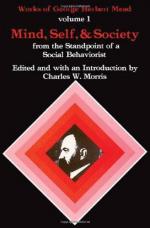|
This section contains 6,931 words (approx. 24 pages at 300 words per page) |

|
SOURCE: "George Herbert Mead and the Philosophy of Philanthropy," in The Social Service Review, Vol. VI, No. 1, March, 1932, pp. 37-54.
In the following essay, Smith elucidates Mead's theory of philanthropy in light of his ideas on the individual, community, and socialization.
Next to the highly satisfying romanticism of an idealism that identifies what is with what ought to be, would come the pragmatic claim that what is implies what ought to be. Success or failure in vindicating such a claim would reverberate far in the social sciences. Almost a quarter of a century ago George Herbert Mead was already so sensitive to the crucial significance, for the social sciences, of this relation between the ideal and the real that he declared that "the evolutionary social science which shall describe and explain the origins of human society, and the social sciences which shall finally determine what are the laws...
|
This section contains 6,931 words (approx. 24 pages at 300 words per page) |

|


